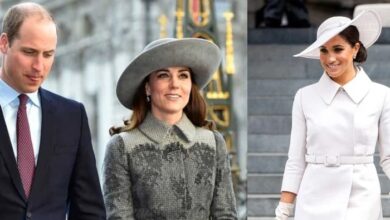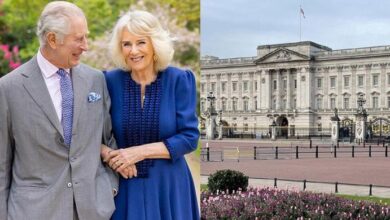
Prince Harry’s ongoing US visa case has seen a significant development, as the Biden administration steps in to defend the confidentiality of his immigration records.
The legal battle stems from questions about whether the Duke of Sussex disclosed his past drug use in his visa application.
This issue arose after Harry openly admitted to using substances such as cannabis, magic mushrooms, and cocaine in his 2023 memoir, Spare.
The case has drawn significant public attention, not only because of Harry’s high-profile status but also due to the broader implications for the privacy of immigration records in the United States.
The Heritage Foundation, a conservative think tank, filed a lawsuit seeking the disclosure of Prince Harry’s visa records.
They argued that the public had a right to know whether the Duke had fully disclosed his drug history when applying for US residency.
However, the Biden administration has firmly opposed such disclosures, asserting that Prince Harry’s privacy outweighs public interest in the matter.
In a detailed court filing, the administration argued that there was no evidence of any impropriety in Prince Harry’s immigration process. They criticized the Heritage Foundation’s claims as speculative and without merit.
“The evidence before the Court plainly sufficed to show that speculation of impropriety was unfounded,” the filing stated, as reported by GB News.
The administration further pointed out that sufficient information about Prince Harry’s immigration process was already available to the public, negating the need for additional disclosures.
The legal team representing the government accused the Heritage Foundation of relying on what they called a “bare suspicion” of misconduct by the US government.
They emphasized that revealing the Duke’s visa records would set a dangerous precedent for other individuals, potentially undermining the confidentiality of sensitive immigration documents.
In September 2024, Judge Carl J. Nichols reviewed Prince Harry’s immigration records in private and ruled in favor of keeping them confidential.
The court dismissed the Heritage Foundation’s lawsuit, agreeing with the Biden administration that the Duke’s privacy interests outweighed any public need for access to his visa details.
The judge also found that the evidence presented by the Heritage Foundation failed to substantiate their claims.
The decision effectively closed the case, confirming that Prince Harry’s visa application followed proper procedures and did not require further scrutiny.
This ruling marks a victory not just for Prince Harry but also for the Biden administration’s stance on protecting the privacy of immigration records, even in cases involving high-profile individuals.
Despite the dismissal of the case, it has continued to fuel public debate and political speculation.
Critics of Prince Harry, including some conservative commentators, have questioned whether his admissions of drug use should have disqualified him from receiving a US visa.
Adding to the controversy, former President Donald Trump suggested that Harry could face deportation as part of broader efforts to crack down on immigration violations.
While these remarks have garnered media attention, they lack any legal basis, as the case has already been resolved in Prince Harry’s favor.
Supporters of the Duke argue that the intense scrutiny of his visa status reflects broader issues of media intrusion and the politicization of immigration matters.
Read More: Prince Harry Plotting His Escape from Meghan Markle as Explosive Claims Suggest Major Life Changes
They contend that the Heritage Foundation’s lawsuit was less about transparency and more about targeting Harry for his outspoken views on social and political issues.
The case underscores the challenges faced by public figures when navigating legal and political systems.
For Prince Harry, the controversy surrounding his visa status is one of many challenges he has faced since stepping back from royal duties in 2020 and relocating to the United States with his wife, Meghan Markle.
The ruling also has broader implications for privacy laws in the United States. By upholding the confidentiality of Prince Harry’s immigration records, the court has reinforced the principle that personal information should not be disclosed without compelling evidence of wrongdoing.
Legal experts have noted that this decision could deter similar lawsuits in the future, particularly those aimed at uncovering immigration records of high-profile individuals.
They argue that the ruling sets an important precedent for balancing public interest with individual privacy rights.
For Prince Harry, the outcome of this case represents a rare legal win amid ongoing public scrutiny.
While the dismissal of the lawsuit protects his privacy, it does not entirely shield him from the controversies surrounding his past admissions and their implications for his public image.
As a figure who has consistently advocated for mental health awareness and personal accountability, Harry’s openness about his past struggles with substance use was intended to foster understanding and dialogue.
However, it has also made him a target for critics who question the consistency of his actions with the privileges he enjoys as a member of the British royal family.
Nevertheless, the resolution of this case may allow Prince Harry to focus on his ongoing work in philanthropy and advocacy without the distraction of legal battles over his immigration status.
For the Biden administration, the case highlights its commitment to protecting individual privacy, even in the face of political and public pressure.
As the Duke of Sussex continues to navigate his life in the United States, the ruling serves as a reminder of the importance of privacy in an era of relentless public scrutiny.
While the legal battle over his visa may have ended, the broader conversation about the intersection of public interest, privacy, and high-profile individuals is far from over.






